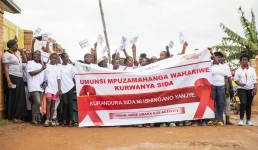For more than 20 years, other countries have given Rwanda free HIV medicine. The medicine is called antiretroviral treatment or ARV. Over 210,000 adults in Rwanda live with HIV. Almost all of them take ARVs. The United States and other groups pay for the medicine.
Francois Xavier Karangwa works to help people with HIV in Rwanda. He worries about what would happen if the other countries stopped paying. Not long ago, the United States said it would give less money. The free HIV medicine still came, but Karangwa says Rwanda should make a plan in case the money stops one day.
Karangwa thinks Rwanda's government, businesses, and people should work together. They need to find ways to pay for the medicine without help. It would be very bad if people with HIV had to stop taking their medicine. They could get sick or even die.
Deo Mutambuka also works with people who have HIV in Rwanda. He said Rwanda could have big problems if the HIV medicine stops coming. More people might get HIV. The virus could also change inside people's bodies. Then, the medicine might not work anymore.
Mr. Mutambuka says Rwanda should not depend on other countries so much. He thinks Rwanda's government should buy HIV medicine and make some in the country. That way, they will always have enough.
A big study looked at HIV in Rwanda a few years ago. It found that 3 out of every 100 adults in Rwanda have HIV. Hind Hassan works for the United Nations group UNAIDS in Rwanda. She told The New Times newspaper that Rwanda should make HIV medicine in the country. People with HIV need to take the medicine forever. Other countries might not always give it for free.
UNAIDS has a special goal. They want Rwanda and other countries to make sure 95% of people with HIV get medicine, and the virus stays low in their bodies by 2030. Rwanda has already done a good job with this goal.
Francois Xavier Karangwa works to help people with HIV in Rwanda. He worries about what would happen if the other countries stopped paying. Not long ago, the United States said it would give less money. The free HIV medicine still came, but Karangwa says Rwanda should make a plan in case the money stops one day.
Karangwa thinks Rwanda's government, businesses, and people should work together. They need to find ways to pay for the medicine without help. It would be very bad if people with HIV had to stop taking their medicine. They could get sick or even die.
Deo Mutambuka also works with people who have HIV in Rwanda. He said Rwanda could have big problems if the HIV medicine stops coming. More people might get HIV. The virus could also change inside people's bodies. Then, the medicine might not work anymore.
Mr. Mutambuka says Rwanda should not depend on other countries so much. He thinks Rwanda's government should buy HIV medicine and make some in the country. That way, they will always have enough.
A big study looked at HIV in Rwanda a few years ago. It found that 3 out of every 100 adults in Rwanda have HIV. Hind Hassan works for the United Nations group UNAIDS in Rwanda. She told The New Times newspaper that Rwanda should make HIV medicine in the country. People with HIV need to take the medicine forever. Other countries might not always give it for free.
UNAIDS has a special goal. They want Rwanda and other countries to make sure 95% of people with HIV get medicine, and the virus stays low in their bodies by 2030. Rwanda has already done a good job with this goal.












